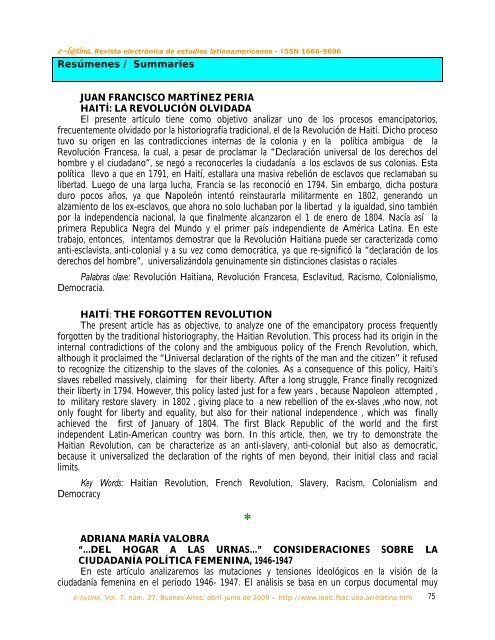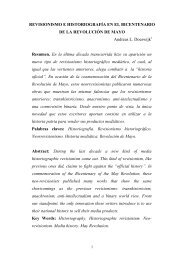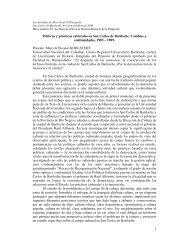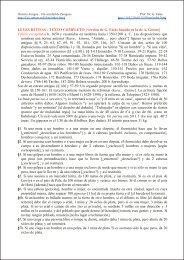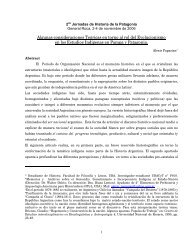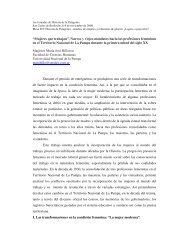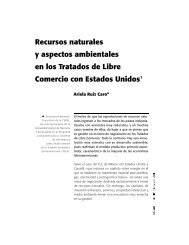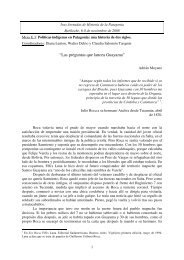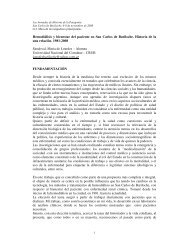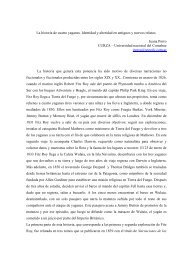You also want an ePaper? Increase the reach of your titles
YUMPU automatically turns print PDFs into web optimized ePapers that Google loves.
f.mAujob/!Revista electrónica de estudios latinoamericanos - ISSN 1666-9606Resúmenes / SummariesJUAN FRANCISCO MARTÍNEZ PERIAHAITÍ: LA REVOLUCIÓN OLVIDADAEl presente artículo tiene como objetivo analizar uno de los procesos emancipatorios,frecuentemente olvidado por la historiografía tradicional, el de la Revolución de Haití. Dicho procesotuvo su origen en las contradicciones internas de la colonia y en la política ambigua de laRevolución Francesa, la cual, a pesar de proclamar la “Declaración universal de los derechos delhombre y el ciudadano”, se negó a reconocerles la ciudadanía a los esclavos de sus colonias. Estapolítica llevo a que en 1791, en Haití, estallara una masiva rebelión de esclavos que reclamaban sulibertad. Luego de una larga lucha, Francia se las reconoció en 1794. Sin embargo, dicha posturaduro pocos años, ya que Napoleón intentó reinstaurarla militarmente en 1802, generando unalzamiento de los ex-esclavos, que ahora no solo luchaban por la libertad y la igualdad, sino tambiénpor la independencia nacional, la que finalmente alcanzaron el 1 de enero de 1804. Nacía así laprimera Republica Negra del Mundo y el primer país independiente de América Latina. En estetrabajo, entonces, intentamos demostrar que la Revolución Haitiana puede ser caracterizada comoanti-esclavista, anti-colonial y a su vez como democrática, ya que re-significó la “declaración de losderechos del hombre”, universalizándola genuinamente sin distinciones clasistas o racialesPalabras clave: Revolución Haitiana, Revolución Francesa, Esclavitud, Racismo, Colonialismo,Democracia.HAITÍ: THE FORGOTTEN REVOLUTIONThe present article has as objective, to analyze one of the emancipatory process frequentlyforgotten by the traditional historiography, the Haitian Revolution. This process had its origin in theinternal contradictions of the colony and the ambiguous policy of the French Revolution, which,although it proclaimed the “Universal declaration of the rights of the man and the citizen” it refusedto recognize the citizenship to the slaves of the colonies. As a consequence of this policy, Haiti’sslaves rebelled massively, claiming for their liberty. After a long struggle, France finally recognizedtheir liberty in 1794. However, this policy lasted just for a few years , because Napoleon attempted ,to military restore slavery in 1802 , giving place to a new rebellion of the ex-slaves ,who now, notonly fought for liberty and equality, but also for their national independence , which was finallyachieved the first of January of 1804. The first Black Republic of the world and the firstindependent Latin-American country was born. In this article, then, we try to demonstrate theHaitian Revolution, can be characterize as an anti-slavery, anti-colonial but also as democratic,because it universalized the declaration of the rights of men beyond, their initial class and raciallimits.Key Words: Haitian Revolution, French Revolution, Slavery, Racism, Colonialism andDemocracy∗ADRIANA MARÍA VALOBRA“...DEL HOGAR A LAS URNAS...” CONSIDERACIONES SOBRE LACIUDADANÍA POLÍTICA FEMENINA, 1946-1947En este artículo analizaremos las mutaciones y tensiones ideológicos en la visión de laciudadanía femenina en el período 1946- 1947. El análisis se basa en un corpus documental muye-<strong>l@tina</strong>, Vol. 7, núm. <strong>27</strong>, Buenos Aires, abril-junio de 2009 – http://www.iealc.fsoc.uba.ar/elatina.htm 75


